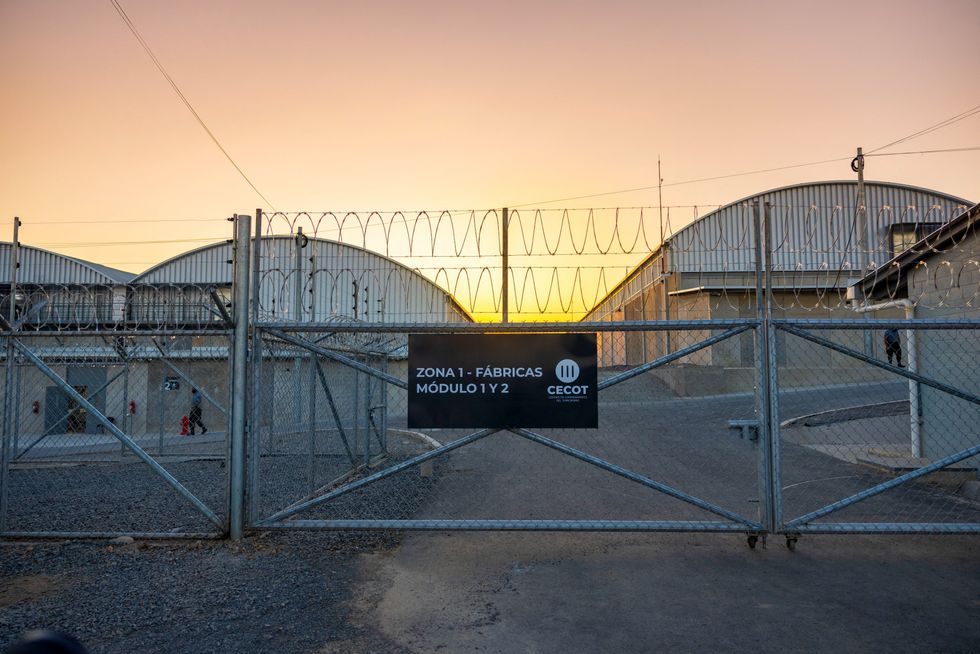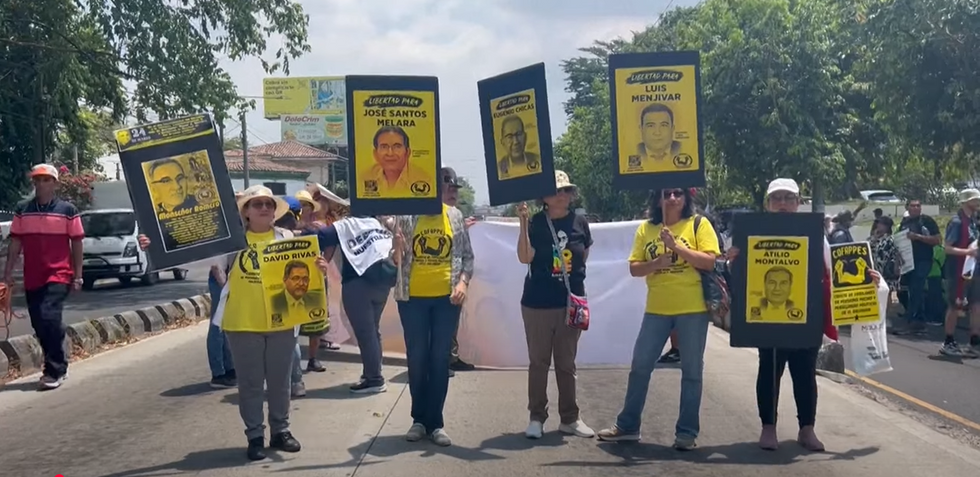*Updated April 16, 2025 at 11:15 p.m.*
El Salvador has made security and mega-prisons its calling card. The so-called “Bukele model,” in reference to Salvadoran President Nayib Bukele, has been admired by leaders of other countries as a benchmark in reducing violence. His runaway popularity is, for now, tied to his clampdown on crime; official figures show 2023 was the safest in the country’s history.
Among his foreign admirers is U.S. President Donald Trump, who welcomed Bukele in the White House this week to discuss El Salvador’s decision to offer its prisons to hold alleged immigrant gang members being deported by the United States. NBC News had reported earlier this month that deported women risked also be sent to Salvadoran jails.
The Bukele model has been questioned for its impact on human rights and the legal rights of individuals. This is particularly the case for women, who are already vulnerable sector of the population. Organizations like local NGO SSPAS (the Passionist Social Service), estimate that at least 10% of the country’s thousands of inmates may be women, many of whom face gender-based violence within the prison system.
“What the government calls ‘peace’ is actually a mirage intended to hide a repressive system, a structure of control and oppression that abuses its power and disregards the rights of those who have already been made invisible — people living in poverty, under state stigma and marginalization — in the name of supposed security defined in a very limited way,” Amnesty International’s America’s Director Ana Piquer wrote X.
In March 2022, El Salvador approved a state of emergency that allows the government to temporarily suspend constitutional rights. That allowed the Bukele administration to pursue its “war on gangs,” known also as the Maras, through use of force and mass arrests without court orders. In three years, it has arrested some 80,000 people using its emergency powers, in a process that human rights groups have described as a strategy of persecution and stigmatization of vulnerable groups — rather than a war on crime.
Overcrowding
El Salvador has 28 prisons including the Terrorism Confinement Center, or CECOT, which is described as Latin America’s biggest jail and a symbol of the Bukele security strategy. Government heads have visited it, as have journalists and content creators, who have shared images of prisoners handcuffed and tightly packed.
Yet human rights groups report that the CECOT houses only a fraction of the prison population, while the rest are kept under critical conditions, marked by overcrowding, lack of access to basic services, and repeated violations of civil rights.
Female inmates are also threatened in terms of sexual, reproductive and menstrual health rights.
Verónica Reyna, head of Human Rights at El Salvador’s SSPAS, is concerned about the issue of overcrowding, saying that at two other prisons, La Esperanza and Izalco, “there are 100 people in cells meant for 30, with no space to sleep and many standing throughout the night.”
Lack of running water, food and medical attention have, alongside complaints about torture, sexual violence and other abuse, have turned the country’s prisons into extremely precarious spaces. Family visits were suspended in 2020. Reyna says this has a greater impact on female inmates, who are also threatened in terms of sexual, reproductive and menstrual health rights.

Spontaneous abortions
According to the SSPAS, there have been reports of pregnant women who have been transferred without explanation and, upon their return, have lost their babies. “They’ve told us that they are given medication without further information and that many end up suffering miscarriages. There is no medical care protocol or follow-up, which creates an environment of complete lack of protection for them,” Reyna said.
The situation is paradoxical as abortion is completely criminalized in El Salvador and the penalties are severe. Yet there have been no investigation into these “spontaneous abortions” taking place in prisons. “If a woman were accused of terminating a pregnancy, she would be immediately convicted, but when the state causes the miscarriage, there are no consequences,” said Teodora del Carmen Vásquez, head of the Mujeres Libres El Salvador (Free Women El Salvador) organization.
Vásquez is now considered one of the leading voices denouncing the condition of women in El Salvador’s prison system. Once a prisoner herself, she witnessed the precarious situation of women in prisons, noting that the isolation of inmates makes their situation invisible to the outside world.
Her case, one of the most widely reported in the international media, is an example of the contradictions regarding sexual and reproductive rights in El Salvador. In 2008, she was sentenced to 30 years in prison for aggravated homicide after suffering an obstetric emergency and giving birth to a stillborn baby. She spent a decade in prison until her sentence was commuted in 2018.
Prenatal care
“No information is coming out. The little we know comes from the accounts of women who have been released and who describe what they’ve experienced. Many have lost their children in prison because they didn’t receive medical care, were beaten, or simply didn’t have access to prenatal checkups,” Vásquez said.
Local NGOs also point out that women are effectively deprived of menstrual hygiene products. With the suspension of family visits, many inmates are left without basic supplies, relying exclusively on what the prison system provides them, which in many cases is nonexistent.
“In prison, I realized all the violence women experience,” Vásquez says. “Thanks to my family visiting me every eight days, I was able to have sanitary pads. But those who don’t receive visits have to make do with what they can. Some use bits of mattresses where hundreds of people have slept, with all the illnesses that can cause,” she adds.
Just a few weeks ago, media outlets in El Salvador reported on the conditions menstruating women face in the country’s prisons. In addition to extreme overcrowding, they face a lack of sanitary pads, drinking water and medication for vaginal infections.
Structural violence in prisons affects everyone, but women face even greater punishment.
In this context, El Espectador spoke with the Menstruantes Collective, which runs a regional menstrual education program on the conditions menstruating persons face in prison. The NGO observed that prisons were built “without a gender perspective,” and therefore fail to meet the basic needs of women held there. Because these women are predominantly from poorer backgrounds, they face even more precarious conditions, with limited access to basic products and medical care.

Structural violence
“From the moment they are deprived of their freedom, they are seen as people unworthy of any rights. Structural violence in prisons affects everyone, but women and menstruating people face even greater punishment,” said Laura Contreras, head of Menstrual Health at the Medellín-based Escuela de Educación Menstrual Emancipadas (Emancipated Women Menstrual Education Center).
The Menstruantes Collective notes that woman produce more cortisol in stressful situations, which alters hormonal regulation and may cause months of missed periods, or irregular and uncontrolled bleeding. Poor nutrition and limited access to drinking water also impact hormonal production and threaten health. Furthermore, many female inmates only receive medical or gynecological care when their health condition has become critical, leading to surgeries that could have been avoided by timely, preventive care.
For women in El Salvador’s prisons, the lack of policies to guarantee their menstrual and reproductive health reinforces neglect within the prison system.
*Originally published March 16, 2025, the article was updated April 16, 2025 with new information about Bukele’s visit to the White House and the NBC report about deporting women.
This post was originally published on this site be sure to check out more of their content.






